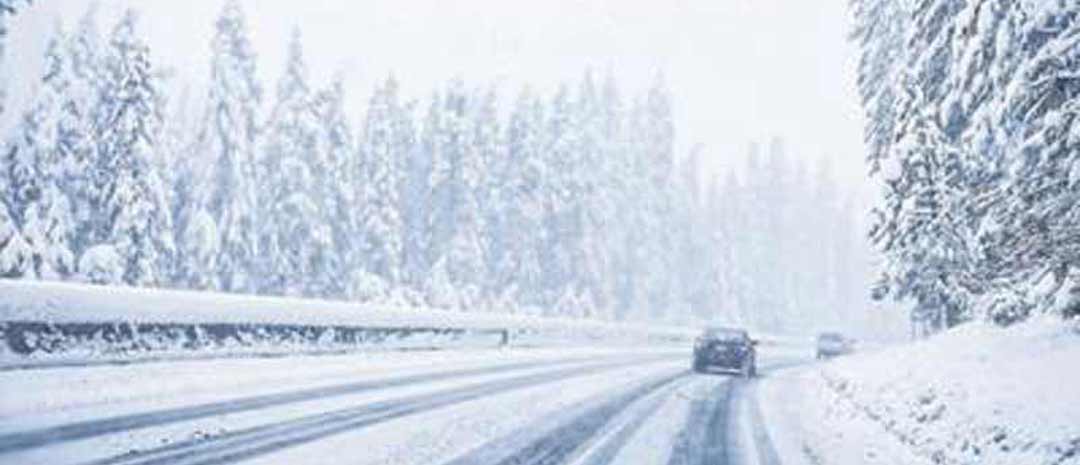New RV owners and experienced drivers alike may need a primer when it comes to driving their RV in snow.
Rarely do we RV owners chose to drive in snow. If it happens, it’s likely that we’re leaving one place (that is cold, snowing, or snowy) to go to someplace warmer and more hospitable. There’s no denying that driving a multi-ton RV can be a white-knuckle experience for just about everyone.
Snow tires
More for your tow vehicle, snow tires will give you extra traction and the ability to drive in heavy snow. They aren’t much good on ice-covered roads. In fact, in that situation, there is very little to do other than stop and wait for the temperatures to rise and the roads to thaw out.
Snow chains
Driving your travel trailer, fifth wheel, or motorhome can be difficult — if not impossible — if you get stuck on a road covered with snow or ice. One option is to purchase a set of snow chains. You’ll want these for all of the wheels, unless you’re towing an RV and have snow tires on your tow vehicle.
Drive safely
Towing an RV is a completely different situation from just driving your truck. You know from driving school that winter driving necessitates slower-than-normal speeds, extra stopping distance, and an abundance of caution. Be sure to familiarize yourself with how your tow vehicle — and RV — handle on snow- and ice-covered roads.
If you have an exhaust brake or tow mode for your diesel-powered RV, consider shutting this off. Otherwise, the back-end of your RV could swerve as power is applied with the brake, putting you in a ditch — or worse.
Extra precautions
Make sure that your motorhome or tow vehicle has a full tank of gas. You may get stranded on a snow-covered road (or in a ditch!) and need to run your vehicle until you get towed out. Plus, you’ll likely be driving slower, which can affect your gas mileage.
Use your low beam headlights as high beams will reflect off of snow and can make visibility almost non-existent in a blizzard or heavy snow storm. If you need to, use your hazard lights to give further warning to vehicles around you.
Adequate emergency supplies in your vehicle are critical. It’s a good idea to stock up on blankets, food, water, medical supplies, and even cold weather clothing if you are traveling in the snow or cold conditions. Always try to be prepared for the possible.
Accelerating, braking, and steering at a slow and steady pace will minimize skidding and make your travels safer for you and other vehicles around you.
Finally, if things get too bad — and don’t wait for that to happen — pull off and let the storm pass, the weather to warm up, and snowplows to do their job. You have an RV, a rolling home. Make sure you use it in emergency situations and think of the safety of yourself, your passengers, and other drivers.

Jim & Debbie Tome
Hi! We’re Jim & Debbie Tome and we run All Things RVing, the online destination for, well, everything about RVing, including tips and advice, RV park reviews, trip planning and destinations, our experiences and insights while RVing, and even some food and drink (and much more!) recipes, reviews, and shares along the way. We hope you enjoyed this article and come back often. You can even subscribe (above!) and you’ll get a nifty little email each time we publish a new article. Don’t worry, we never share your email or personal info with anyone, any website, or any company. Thanks for reading!
RV extension cords and adapters
There's nothing worse than not being able to hook-up to electric service at an RV park or state or national park. Here's how to be prepared. Many RVs have onboard generators. Still, others have solar panels on top or owners use portable panels to capture electricity...
Los Angeles Japanese Garden
Like to see what your municipal tax dollars could accomplish? This urban Japanese garden is unlike anything you've ever seen at a water reclamation plant. We were in Los Angeles this past fall, visiting our daughter. It's a funny place — so sprawling, so diverse, so...
Stopping RV inside condensation
Waking up to windows covered in condensation is no fun. Not only can't you see outside, but cleaning them can be messy and tiring. Condensation happens when the air in your RV has a high level of humidity and that warm, moist air meets a cold surface, such as an...

Visit some of our most popular pages and sections of our website.
| Advice & Tips | Reviews & Recommendations |
| Places & Sites | Food & Drink |
| Connect With Us | Contact Us |

All Things RVing ![]() P.O. Box 313, Sycamore, Illinois 60178
P.O. Box 313, Sycamore, Illinois 60178 ![]() 815-508-3878
815-508-3878 ![]() info@allthingsrving.com
info@allthingsrving.com





0 Comments